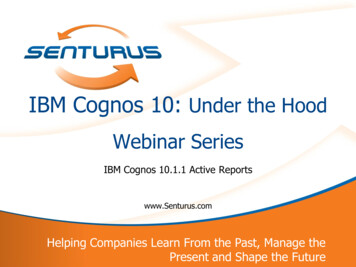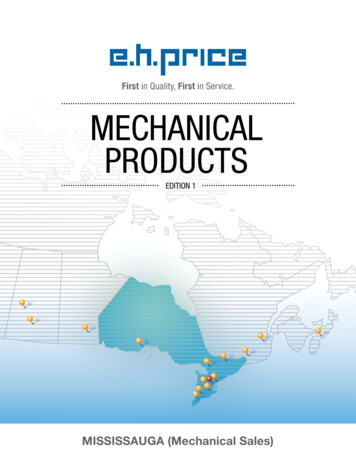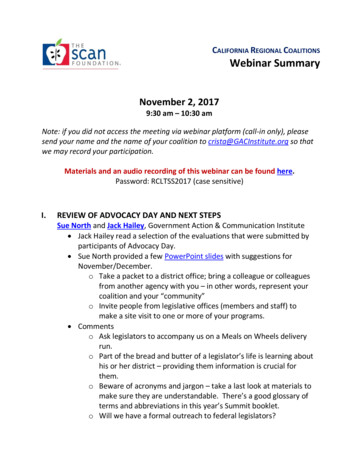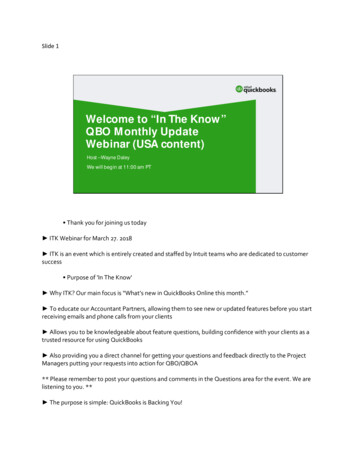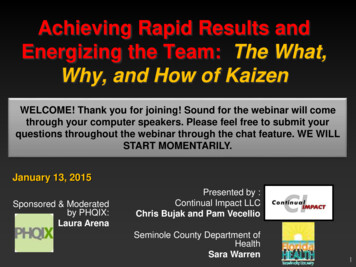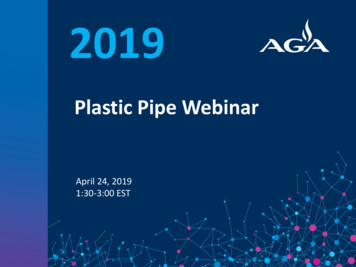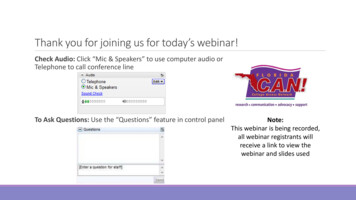
Transcription
Webinar Series: Employment First:From Idea to RealitySuccess Stories: What is Possible in theWorld of Employment First?March 14: 3:30 pm – 4:45 pm EST
Tennessee: Amy Gonzalez, State Director of Employment & Day Services, TennesseeDepartment of Intellectual and Developmental Disabilities Stephanie Potter, Youth and Disability Services Manager WorkforceConnections - SRVSMinnesota Derek Nord, Associate Director, Research and Training Center onCommunity Living (NIDILRR)Institute on Community Integration Jon Alexander, CEO, KaposiaWashington State Wally Tablit, Director of Community Employment Services Northwest Center
Tennessee
Employment First: From Idea to RealityAmy Gonzalez, State Director of Employment & Day Services for DIDDStephanie Potter, Director of Community Employment Services for SRVS
How we Started Acknowledged the state needed to change segregatedservice delivery systems to integrated systems Became a Protégé State in 2012 Approached 3 providers in each region Secured buy-in from state partners––––––Vocational RehabilitationDepartment of LaborMental Health & Substance Abuse ServicesTennCareDepartment of EducationCouncil on Developmental Disabilities
Next Steps Executive Order No.28– Employment First Task Force– Annual reports to Tennessee’s Governor Haslam Creating Memorandums of Understanding– Transitioning Youth MOU– VR – DIDD MOU– E1st MOU’s with providers Supporting providers with barriers by creating solutions– Policy– Rate redesign– Flexible Day Services Capacity Building– Training on Customized Employment and Discovery– VR pilot Customized Employment Letter of Agreements
Keeping the Momentum Quarterly E1st callsQuarterly E1st CoP webinarsCalls and meetings with SME’sIdentification of goals and evaluation of progressEducating the communityKeeping leadership abreast and engagedProviding support, guidance and encouragementListening to feedback and taking into considerationMaintaining partnerships to fulfill the E1st vision andmission
The Tipping Point for SRVS Approached by DIDD to participate in EFSLMP (Fall2012) Leadership worked with SME’s as part of EFSLMP(April 2013) Created steering committee with board members,family members and staff (May 2013) Board members on steering committee championedclosing the shop to the board (Summer 2013) Board approved closing the shop (Aug 2013)!!
Funding the Transformation Knew we would have to work with existing servicedefinitions and rates, but had to get creative Contract work was dying down and Employment andCommunity based rates are much higher than facility Pilot LOAs with VR and Group Discovery rate withDIDD With capacity change we needed some majoradditions so we had to look for grants andcontributors For vehicles, mobile communication/documentingand wages for staff
Capacity Building and Decentralization Measuring Outcomes and Performance - Comprehensive databasedeveloped Deployment Plan Ticket to Work Built relationship with VR - counselor on site Employment Staff Reorganization - Stabilization Job Coaches, Salesand Marketing staff Assessment of Community, demographics and resources Social Capital and Relationship Building - outreach to churches andcommunity centers Blended Day Services Volunteering, Job Club sites, other community activities Travel - resources, partnership with MATA
Developing Talent and EmployerChampions Consistent Message Individual Transition Planning Career Center Soft Skills Classes Employer Guest Speakers Group Discovery Included family in homework assignments Employer visits and tours Benefits workshops AutoZone - hired 2 people at first, now hired 8 making over 10 perhour American Stairwell - hired 3 persons supported Macy’s ABM - hired 5 people
SRVS Transformation Outcomes toDateSRVS Transformation Outcomes to Date3%37%Community EmploymentCommunity Based Services60%Loss- left SRVS
Paula’s Success Story
Workshop Closure Ceremony videoSRVS Workshop Closure Ceremony Video:https://youtu.be/nfS61fHZBBg
SRVS Contact Information Tyler Hampton, Executive DirectorTyler.Hampton@srvs.org Troy Allen, Director of Community Based ServicesTroy.Allen@srvs.org Stephanie Potter, Director of Community EmploymentServicesStephanie.Potter@srvs.org www.srvs.org www.facebook.com/SRVS Twitter @ SRVSnews
DIDD Contact Information Amy Gonzalez. M.S., CRCState Director of Employment & Day ServicesDIDDp. ww.tn.gov/didd/topic/employment-firstTwitter @diddtnhttps://www.facebook.com/tn.didd/
Minnesota
Minnesota APSEStrategic Planning Function Mission Driven Strategic Plan Standing Committees Annual Training ConferencesMinnesota Employment First CoalitionCoalition Building with Stakeholders 3 Employment First Summits 2 Mini-Summits Employment First Manifesto & Scorecard National White Paper on Employment First Building Employment First Champions & Coalitions Oversight of integratedemployment initiativesMinnesota Employment Policy Initiative (MEPI)Coalition Building & PolicyMinnesota Employment Training & TechnicalAssistance Center (MNTAT)Coalition Building & Practice Partnership with National APSE Partnership with Griffin-Hammis Associates 13 Listening Sessions with stakeholder groups Web-Based Training Resources & Materials Policy analyses & written briefs with systemschange recommendations Topical Webinars Annual Disability & Employment Conference Annual Disability & Employment Conference Building policy champions with ctakeholdersand CATs 4 Community Action Teams (CATS) Improving policies to increase competitiveemployment of Minnesotans with disabilities Training & Technical Assistance Workforce training to improve employmentpractices & outcomes
Washington
EMPLOYMENT FIRST INWA STATE The Developmental Disabilities Administration is part ofstate government, and provides the majority of services tocitizens who have a developmental/intellectual disability. Washington was one of the first states to implement a“work first” approach, initially in state agency policy andlater in state law. DDA Policy 4.11, County Services for Working Age Adults,was signed in 2004 with full implementation in 2006. In Washington, only by exception or when certaincircumstances are in place do persons of working age (2162) receive non-work program services (Community Access)
MOVING AWAY FROM SEGREGATEDSERVICES MODEL Fewer and fewer persons are enrolled inPrevocational services over time. In 2003, 38 agencies provided Prevocationalservices to 989 people. In 2015, 21 agencies serving around 376 peoplewith this service. King County, the largest county in WA State, hasmade an intentional plan to be done withPrevocational services by 2019.
ENROLLMENT BY PROGRAM TYPESTATEWIDESERVICE: March 2015Total Open CSAsPercentIndividual Employment551468.1%Group Supported Employment123715.2%Prevocational Services3764.6%Community Access96111.9%Grand Total - 8088100.0%Source: DDA Case Management Information System Cost Benefit Analysis Report
CURRENT PRACTICES COLLABORATION– Off The Clock– Cross Agency Collaboration Project TECHNICAL ASSISTANCE AND TRAINING– Community Summit– Recruit, Train, Retain ORGANIZATIONAL STRENGTH– WA APSE– CEA – Community Employment Alliance INNOVATIVE APPROACHES– School to Work
QUESTIONS?
– VR – DIDD MOU – E1st MOU’s with providers Supporting providers with barriers by creating solutions – Policy – Rate redesign – Flexible Day Services Capacity Building – Training on Customized Employment and Discov


